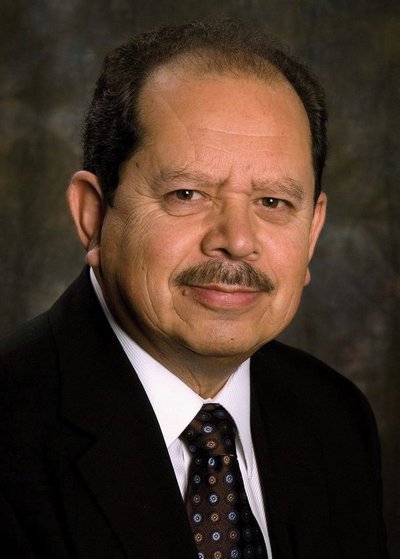May 31, 2007
Erasmo Gamboa
Erasmo Gamboa spends a lot of time on the golf course, but he’s not trying to improve his handicap. Gamboa, associate professor of American Ethnic Studies, devotes many hours each year to producing a golf tournament that benefits an institution he believes in. It’s for those efforts and others that Gamboa has been given the Outstanding Public Service Award.
The annual Sea Mar Charity Golf Tournament, Gamboa explains, began with a desire to throw a party. For some years he had been an active volunteer at the Sea Mar Community Health Center, “one of the largest community health organizations in the state addressing the needs of underprivileged communities.” The work of the center is largely supported through grants, but he and four fellow volunteers wanted to give a holiday party for patients and their families. One of those volunteers belonged to a golf club, so he suggested a golf tournament.
The group set a goal of $10,000, which they far exceeded. In fact, in the 10 tournaments they’ve held since the beginning, they’ve raised more than $1 million. They’ve been able to hold that party, at which they provide gifts for 10,000 children at various locations. But over the years they’ve also provided scholarships to children of farm workers — 50 $1,000 scholarships last year.
Gamboa has a soft spot for the children of farmworkers because he was one. He grew up in Eastern Washington, traveling with his Mexican-born parents as they followed the harvests.
“I can remember going to a lot of different schools, and each time I’d have to register,” he says. “They’d ask my parents’ profession, and I’d have to put down ‘farm laborer.’ I remember the heavy stigma attached to that.”
In high school he was not expected to achieve and he didn’t. He joined the Navy after graduation, and that’s where he noticed that the difference between officers and enlisted men was education. So, when his military obligation ended, he enrolled in Yakima Community College. He was there in 1968 when some African American UW students visited, looking to recruit students of color. Gamboa was one of 30 Chicanos to answer the call. He arrived that fall to a campus teeming with activism, a scene that quickly enveloped him. He was one of the founders of MEChA (Movimiento Estudiantil Chicano de Aztlan), the Chicano student organization.
Inspired by Cesar Chavez, the labor leader who was then trying to unionizefarm workers in California, he chaired a successful student effort to extend the grape boycott to the UW campus.
“That was an incredible learning experience for me and others in terms of how to organize, how to commit yourself to issues of social justice and how to advocate for people in need,: Gamboa says. “I’ve never strayed far from that in my life since then.”
He earned his bachelor’s degree in Romance languages and his master’s and doctorate in history. His first teaching job was at Seattle Central Community College, and while there he helped to organize a group that ultimately won a lawsuit forcing the community college district to hire more Latinos.
In addition to his involvement in social justice issues and his work with Sea Mar, Gamboa has given many hours of his own time getting the history of Latinos in the Northwest to ordinary citizens, especially children. He produced educational materials on the topic, then got them placed in all 200 school districts in the state. He’s also traveled to schools to teach. In 1992, He was presented the Governor’s Ethnic Heritage Award for his contributions to Washingtons ethnic heritage.
“It is hard to describe the emotion one feels when you witness Dr. Gamboa, reaching out to give a particular student a copy of his latest book after one of his stirring history presentations to a group of migrant farm worker students,” writes Antonio Sanchez, director of economic development and international relations in the lieutenant governor’s office. “To that student, it is more than a book; it is a ticket to a life of fulfillment and affirmation.”
Which is what Gamboa wants for them.
“I think there’s an obligation to give back,” he says. “The people that I serve, they mirror my background. I don’t have to be reminded of my commitment.”

